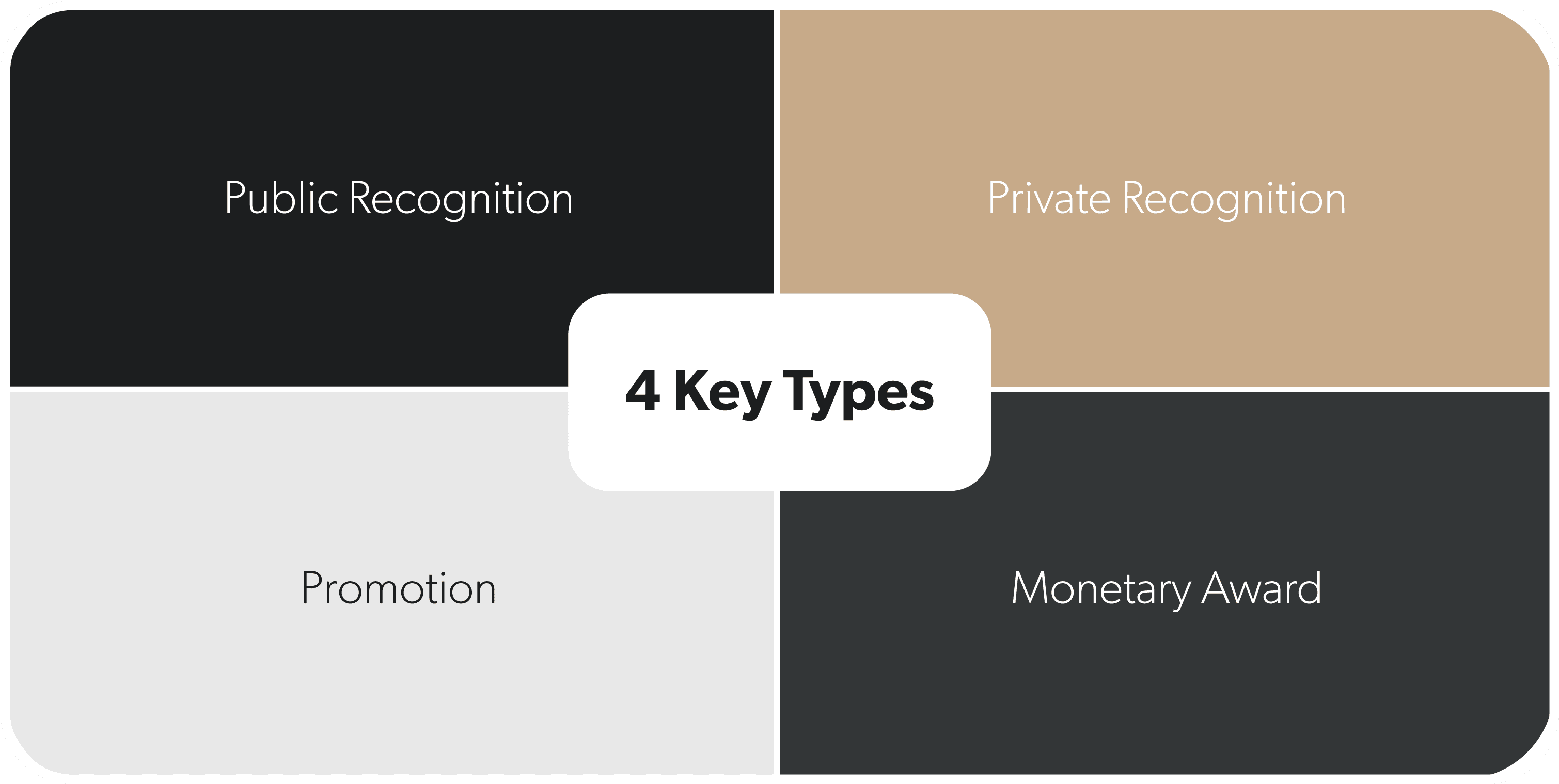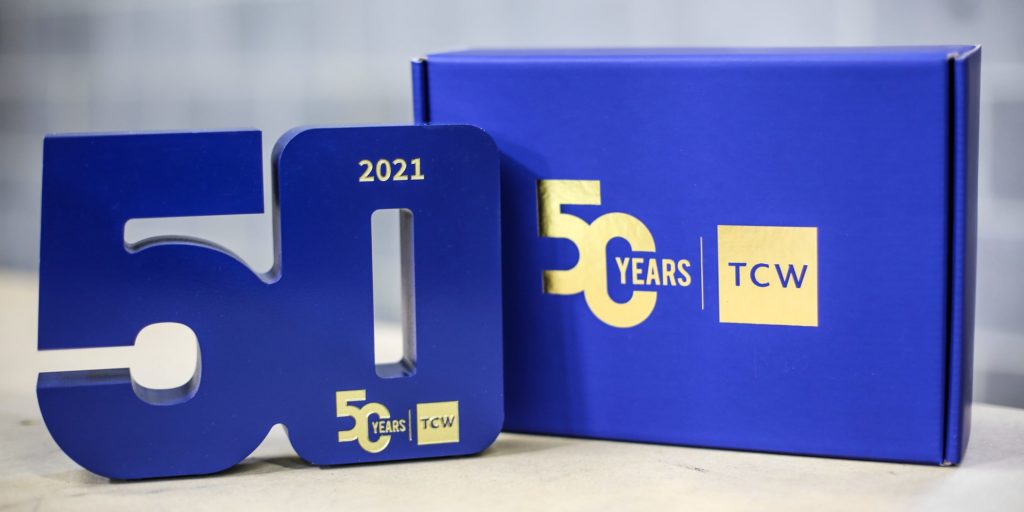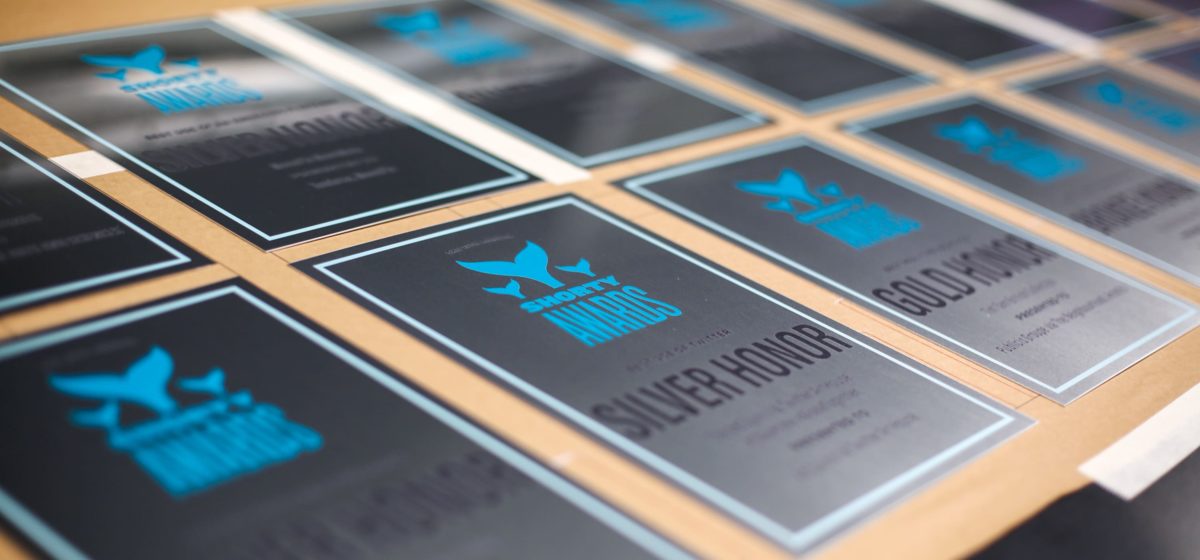The most important types of recognition
Recognition is a critical part of being human. We seek to be admired and appreciated. From being named employee of the year to being told that you’ve made someone proud, employee recognition is important and powerful. Countless types of recognition all contribute to this form of motivation in their own unique ways.
At Cristaux International, we spend every day designing and manufacturing recognition programs for diverse clients. Every member of our team believes in the positive impact of recognition. We uphold high standards for our work and culture because we wish to make the world a more positive place.
With our experience and expertise, we’d love to guide you through our passion. From examples to benefits and more, we are dedicated to educating you on everything recognition. We want to do our part in helping you celebrate your team.

What are the 4 key types of recognition?
Like the galaxy, recognition is a vast and complex world of possibilities. Once you dive in, you’ll be wowed by what can be done. We’ve condensed that whole, beautiful universe into 4 categories.
Public recognition
Public recognition takes place when someone is celebrated in front of others. For example, an employee’s achievement can be applauded in front of their team or featured in a newsletter.
Private recognition
Private recognition happens one-on-one. No one else but the recognizer and the honoree are included. This includes direct messaging and thank-you notes.
Promotion
A promotion recognizes an individual with a new position, responsibility, or project. Giving a promotional reward shows the individual that you trust them to take on more.
Monetary reward
Monetary rewards recognize individuals with fiscal offerings or compensation. Examples include bonuses, pay raises, event tickets, gift cards, and more.

Employee appreciation ideas
The best employee appreciation ideas are the ones made for your team. You may be planning an annual event or looking for ways to improve day-to-day recognition. Regardless, each program has a meaningful purpose and tactics that inspire growth.
Awards
Custom awards make your recognition efforts tangible. Physical recognition pieces give your recipients something to hold and admire. Awards and trophies can be displayed in employee offices to remind them of their hard work. Examples include leadership awards and safety awards.
Verbal rewards
Verbal rewards refer to any appreciation expressed aloud. Verbal recognition ranges from informal compliments said in meetings to speeches at formal events honoring an individual’s achievements.
Written rewards
Written recognition uses written communication to celebrate someone or some group. For example, you can give a handwritten note that welcomes or praises a new employee who just joined your organization.
Bonuses
Bonuses are additional monetary compensation, outside of one’s salary or wage, offered to employees for various reasons. Your salespeople can be rewarded bonuses for meeting goals or quotes. Also, all staff members can be given end-of-year bonuses to celebrate a successful fiscal year.

Milestones + important events for employee recognition
The Cristaux team strongly believes in celebrating every major event with a milestone award. These creations act like markers along your organization’s timeline. It’s beautiful to look back at the memories and honor where your team has been, what they accomplished, and where you all are going.
Work anniversaries
Work anniversaries mark every year each employee has worked at your organization. It’s appropriate to grow an employee work anniversary gift with the years. For example, a one-year-anniversary gift will be less costly than a ten-year-anniversary gift. For that first year, you could give employees a handwritten letter and company swag. For their tenth year, employees deserve select creations or additional benefits.
End of the year
With the end of each year, it’s important to give thanks to your team and congratulate them on another year in the books. Celebrating at each year’s end helps your recognition program remain consistent. Consider gifting employees end-of-the year bonuses and company branded gifts like wine glasses and Yeti mugs.
Project completion
Your team put in months, maybe years, of hard work for one project. It paid off, and they’ve completed the deal or won the new client. Celebrate with unique deal toys or intricate building replicas.
Birthdays
Celebrating employee birthdays appeals to the personal side of workplace recognition. Just like how you celebrate your loved ones’ birthdays, gifts do well in the workplace too. Corporate gifts are best when constrained to a specific budget and chosen with each recipient’s interests and passions in mind.

Examples of recognition programs
The options for recognition programs are like a buffet: seemingly endless. While pondering different examples, it’s important to ask yourself what would best fit your team. What do you want to celebrate and encourage at work?
Peer-to-peer recognition
Peer-to-peer recognition happens when teammates or employees recognize one another for various accomplishments. This type of recognition is exceptionally meaningful because it comes from those who work with you every day. Compliments from those closest to you mean more because they know you more deeply.
A popular form of peer-to-peer recognition is presenting a people’s choice award voted on by team members. This democratic award includes everyone and encourages great buy-in from your team.
Leader-to-team-member recognition
Recognition from a leader to a team member greatly motivates other employees. By seeing a fellow colleague being celebrated, in turn, the rest of the team wants to receive the same positive treatment. Departmental rewards allow managers to recognize one of their team members. Also, employee of the month programs inspire others to work harder to be recognized as well.
Employer-to-employee recognition
Employer-to-employee recognition is like leader-to-team-member recognition, but it only pertains to the workplace. Employee recognition programs have great range. Reflect on what values you want to highlight within your team and shape your recognition efforts for that goal. You can celebrate retirements, design corporate awards, develop a service award program, and more.

What are the benefits of employee recognition?
Employee recognition is essential to organizational growth because it has countless benefits for your team:
- Stronger workplace relationships
- More positive work environment and culture
- Greater employee retention
- Improved employee engagement
- Successful performance
- Increased recruitment of high-caliber newcomers
Setting up a great recognition program
All types of recognition are beneficial, but it’s a matter of choosing and implementing what is the best for your team. Consider which ideas, events, and program types make the most sense for your culture. The most successful recognition efforts are genuine and tailored to each team.
Contact Cristaux to start planning your recognition program today.
FAQs: types of recognition
You may have some questions that need answers, so we’ve provided information on frequent questions from people like you. If you can’t find what you’re looking for below, visit our FAQ page or contact our team.
What is the best type of recognition?
The best type of recognition is developed with your team or recipient in mind. Genuine appreciation goes a much longer way than something expensive. Valuable recognition programs are personalized and tailored to your team.
What are recognition techniques?
The four basic types of recognition include public, private, monetary, and promotional recognition or rewards. Specific and popular examples include giving handwritten thank-you notes, celebrating employee work anniversaries, presenting President’s Club awards, and issuing end-of-year bonuses.
How to recognize employees virtually?
Virtual recognition needs to be consistent, genuine, and customized for each individual. Read this blog post to learn how to keep company culture with a remote workforce.
What is an example of formal recognition?
An example of formal recognition is hosting a company event during which you honor employees with awards or certificates. Formal recognition requires planning, unlike its more spontaneous and informal counterpart. You can commemorate retirements, present sales trophies, celebrate business deals, and more.
